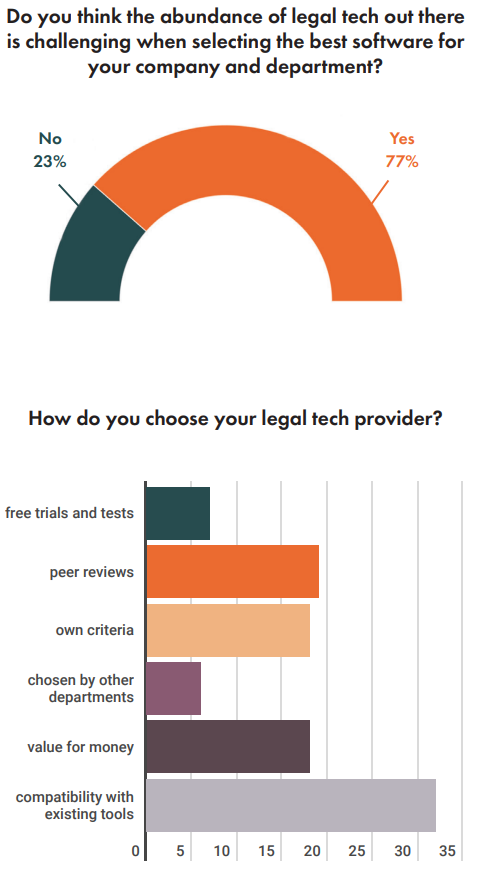
In this ever-changing world, technological advancements are in continuous development. The number of devices and legal tech out there is increasing day after day. And yet, a substantial majority of surveyed QCs believe the extensive choice that legal tech offers nowadays pose several challenges when selecting the best tools for in-house counsel. In short, out of all responses to questions that detailed the major stumbling blocks to investing in new legal tech, the primary factor was the overwhelming number of options of legal tech that have swamped the market.

The data should not, however, be understood to exclude other challenges regarding selecting software, which include corporate attitudes towards change, deprioritising the needs of legal counsel compared to the corporate side of business, stinginess when faced with expensive software options, and difficulties in conveying to corporate management that legal tech was necessary in light of increased volume and type of workload.
The majority of the respondents affirm that they select the legal tech provider considering the compatibility with software already in place. In-house lawyers look for tools that are compatible with the internal environment and that are easy to use.
Budget plays once again a pivotal role in selecting legal tech. The most common way to proceed among our respondents is by having a direct experience through free trials and tests. Still, the final choice is given by the costs and efficiency of the products.
An interesting finding is, however, that a high percentage of our respondents rely on word of mouth and peer reviews who have had first-hand experience using the given legal tech. Perhaps, knowing that colleagues are happy with their choices can make GCs more confident when choosing since they can concretely see the added value that a specific tool has brought to other legal departments.
Additionally, some in-house legal teams have created their own tailored criteria to make the best choice. As one general counsel suggests, ‘it must be easy to use and intuitive; it must be compatible with our systems already in place.’ Clearly, when one turns to legal tech searches for a solution that is time-saving and quick to learn, especially when the department in question is a larger team, re-training all the members would probably require some time.
However, a minority of the respondents affirmed that the legal department and general counsel have little say regarding selecting the right legal technology. It seems that the final say goes to the IT department. One GC said, ‘the fact that we do not choose is part of the problem.’ While the IT department is probably more familiar when it comes to technology, legal departments being the ones using certain tools on a daily basis would feel way more comfortable being the one selecting the most suitable to respond to their needs. Perhaps having a standardised process in place when selecting legal tech that considers the opinion of both departments could represent a more viable solution.


